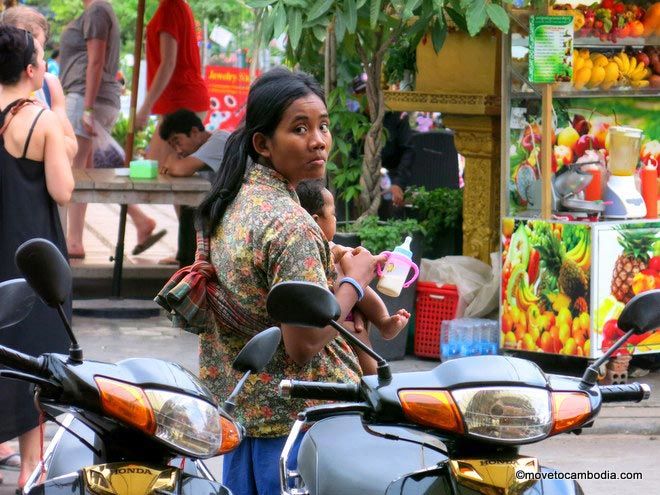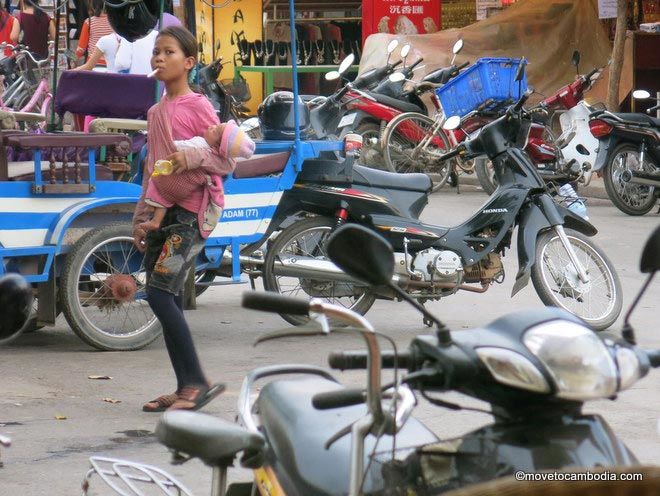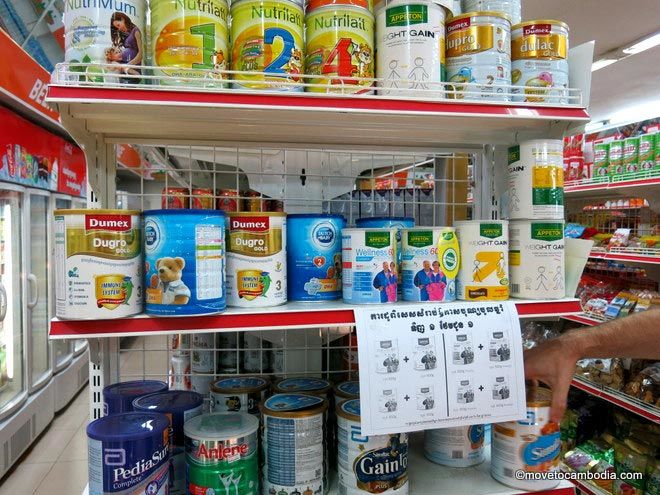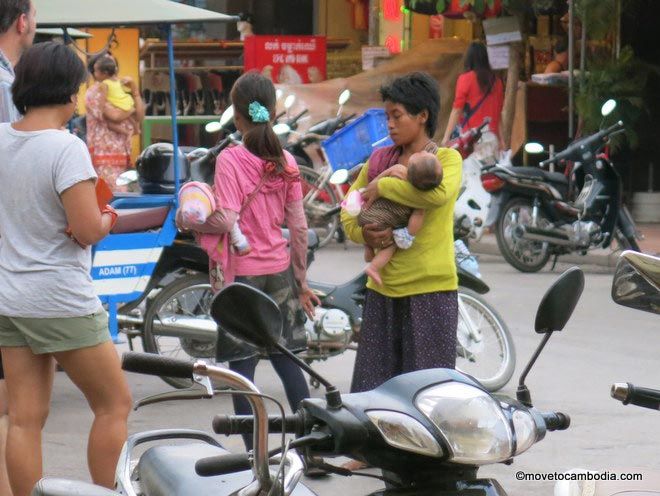If you’ve been to Siem Reap’s Pub Street, undoubtedly you’ve been approached by a bedraggled young mother or child holding an empty baby bottle and toting a sleepy-looking infant. “The baby is hungry,” they plead. “I’m not asking for money, just formula for my baby.”

Got scammed? Don’t fall for the powdered milk scam in Cambodia.
Every night, well-intentioned tourists fall for this scam, thinking that the $30 canister of formula they are buying is going to feed that drowsy baby, allowing both she and her caretaker to head home. Unfortunately, that’s not really what’s going on. All of the formula that’s purchased is promptly returned, with the proceeds being split with the store (Huy Meng Minimart under X Bar on Sivatha Blvd at the bottom of Pub Street is a favorite).
Now you may be reading this and wondering what’s the big deal? This desperately poor family is getting some much-needed income, so why does it matter if they trade the formula for cash?
The truth is much darker. Local expats speculate that the baby-beggars are run by a mafia of sorts. If you get a cup of coffee on Pub Street in the early evening before sunset, you’ll see seven or eight young women descend on the street at the exact same time, each of them carrying a bleary-eyed baby slung to her hip, many of them blowing cigarette smoke in their faces. Women don’t always carry the same baby, indicating that the babies are merely rented or borrowed for the night. Many of the babies are carried by older children and the babies are uncharacteristically docile.

Children and women carrying babies all descend on Pub Street at the same time, carrying half-empty bottles.
Local child protection organizations say that they haven’t seen evidence that the babies are drugged, but it seems entirely possible in order to assure their pliability and make them seem more pathetic and sympathetic. Personally, there’s only one baby I’ve seen on Pub Street that seems alert, the rest are scarily mellow, especially when one considers the fact that they are there for up to 12 hours at a time.
Expats who have tried to warn tourists that are falling for the scam have been threatened with violence. When a young girl carrying a baby asked me to buy her milk recently and I declined, she scratched and pinched my arm. It’s not hard to imagine the desperation these young women must feel–after all, they likely need to pay for the baby they are renting and if the mafia theory is correct, their handlers may be watching to make sure they bring in enough money each night.
For tourists, handing over $20 or $30 to buy a can of formula is a quick, feel-good experience. Just a few days ago I saw a tourist taking photos of himself posing with a canister of formula and the bedraggled street kid he was buying it for. He probably went straight back to his hotel to post about the experience on Facebook, and no doubt received an appreciative response from his friends, who were just as clueless about the reality of the situation as he.

This baby formula has probably already been bought and returned several times today.
But there are more reasons than just losing their money that tourists shouldn’t be participating in this scam. For one, think of the babies. These babies are likely being drugged, kept up all night and even being deprived of food to make them look more desperate. Toddlers that are swaddled for hours upon hours long after the age of infanthood do not learn to walk properly. And tourists are the ones supplying the demand for these abused babies. If no one was willing to reward these scammers, they would have no motivation to keep these babies on the street.
“The scam is a albeit slightly more lucrative version of begging,” James Sutherland of Friends International, explains. “Poor mothers and vulnerable infants are always at risk on the streets, and scams like these keep them there, day in, day out.”
Children are also used in this scam, often toting the babies themselves. Because they have more value as beggars or scammers, they are kept on the streets all night, instead of sleeping and going to school in the mornings. When poor families have financial incentive to keep their children out of school–especially when there are addiction or gambling problems in the home–many choose to keep their children on the street.

Just say no to sleepy babies in Siem Reap.
Recently in Thailand a gang of children selling roses on a busy nightlife street were discovered to be trafficked, sold or rented by their families and then never heard from again. It’s hard not to think that if tourists just said “no,” this market in child beggars would not be so prolific.
Buying formula does not help these babies, it does quite the opposite. Buying powdered milk (or, indeed, buying anything from children on the street) only gives their parents reason to keep those children on the street. In this case, where it appears that a much more sinister situation exists than families merely begging for money, you must understand that by participating in any way, you are contributing to the abuse of these children.
“We believe that well-meaning people should not perpetuate that cycle, but should rather direct their attention to getting families like these off the streets and out of poverty and that can be done by supporting organizations working to do that, with education, training and income generation programs,” James Sutherland of Friends International, a local child-protection organization, told us.
What should you do if asked to buy formula for a baby?
Just say NO. Tell your travel companions and guesthouse about the scam. The more people that know about it, the less prevalent it will become. Familiarize yourself with Friends International’s ChildSafe Traveler Tips, who suggest that you not give to child beggars, buy postcards or items from children selling on the street or visit orphanages in Cambodia.
Thank you for this. Today I watched a tourist nearly get scammed on pub street and I walked over and told him he was getting scammed. The child with a baby came over afterwards and sat outside the restaurant threatening me with violence and tell me he or she (we couldn’t tell), was going to “fuck me up” as soon as I left. The child sat outside the restaurant for a solid 15 minutes uttering threats before vowing to come back for me later. The whole time the baby he/she was holding was entirely docile and glazed over. In terms of travel, I’ve been to over 40 countries around the world and am not easily phased but I can certainly see how that could be a very unpleasant experience for an inexperienced traveler.
Jessica, that child is the same one that scratched and pinched me (I think she’s a girl, but am not certain). Her command of English swear words is certainly impressive.
Lina, her English was impressive! If only she could put it good use for a legitimate purpose. It’s fairly disturbing that a child that young would resort to violence and has been socialized to think assaulting persons is okay. Pinching and scratching at 8 years old is generally harmless, but I fear for what that child is going to become when it gets older.
Sometimes the tourist police and “undercover/plain clothes” police round them up in an alley but it is short lived as they come back the next night. You can tell when you see 3 or 4 ,with baby in tow, running down an alley. With all due respect to the police, I’m sure they just take some money.
Maybe we should just target the places where they can get a “refund” like the markets mentioned.
No source of revenue would cut it down dramatically.
Just a thought!
The expat group in Siem Reap has discussed that quite a bit. The issue is that the stores are getting half the profit, so they have no incentive to stop. Expats boycotting them won’t matter, because they make all of their profit from tourists. Not sure what the solution is other than to educate as many visitors to Siem Reap as possible.
Get a picture of the “refund” in action. I’ll volunteer to stand outside for a couple of hours each day and speak to tourists. Or would that be illegal?? Maybe just the attention of “P P Post” might help a lot. Take the revenue from the street girls and stores and they start another thing but maybe without the babies??
Believe me some negative press that continues will help.I don’t think Lucky or Angkor Market partake?
I’d even donate a few bucks to have Tuk Tuk driver take them to another market.
Well put together piece of information. Wish there was a way to get it to the incoming tourists at the airports or land border crossings. I’m not a fan of Pub Street after living here for a couple of years but I do see it often even outside of that area. Be nice if this info could be distributed at “check in” at the major hotels and guest houses.
Keep up the good work in getting the information out.
Vincent
Thanks, Vincent. I think expats working together to inform tourists is probably the best chance we have of stopping this.
Thank you for writing this, it’s such a different experience being an expat compared to being a tourist. It’s hard to explain the bigger picture/context to visitors who are understandably swayed by their emotional response to the poverty around them. You and organizations like Friends do a great job getting the word out, but I’m sure to so many tourists it’s so counterintuitive not to buy that can of formula or postcard. It’s a great idea to get guesthouses, hotels and travel guides (like this one) to help spread the word, I would’ve easily fallen for the ‘tea house’ scam in Beijing if I hadn’t read about it on travel websites first, those poor college students from the countryside seemed so sweet!
If you are unsure if this is really a scam or not or are a newbie too guilt ridden to resist, then the thing to do is to open the powdered milk container before handing it over to the girl. This renders it unsellable, and her reaction will tell you if she is a scammer or not.
Good idea. I was thinking of the same idea. Offer to open up and see their reaction.
There is no doubt they are scammers. They do this all night, every night. Buying the milk and opening it just means that you’ve spend $20 to see the look on a poor woman’s face when you ruin her scam. Better to just say “no thanks” and walk away.
I am glad to see this being posted…I visit Cambodia at least twice a year & only last year nearly fell for this …when I queried the shop assistant, she admitted it goes on all the time, so I confronted the young girl & told her I would have no part of it…she abused me in no uncertain terms in very good English!! So yes please don’t feel bad about refusing you can do a lot more positive things with your donations!
We wittnessed this everyday we were in town and we even wittnessed the young girl handing over her takings to some guy on a motorcycle. Another girl with 2 tins of baby food jumped on the back of the bike to go and sell the food no doubt. we had been warned about this scam, so sad to wittness thi Those poor babies.
sad that there are poor people in Cambodia who will resort to this to get money. The government needs to step in.
Great to see the truth out on Facebook…. Lets hope all travellers get to hear about the scams and just say “NO” if there is no money in it for them perhaps it will deter them, But the reality is they will probably think up something else. What can we do, Give no money to children at all full stop. If you want to give them something, buy the a drink or something to eat or an ice cream thats it.
Yep…for info price for baby renting was a few years back about 10RMB/day/per kid in China so roughly 1.5$ a day or so….twins comes from 15RMB….Sorry for the sad info, but….
There is a rent a wheelchair mafia on Riverside in Phnom Penh. I’ve witnessed $40 being handed over for a wheelchair. Then the fully able-bodied client sit and wheel the chair down riverside begging.
That being said, there are folk confined to wheelchairs on riverside too.
$40 seems pretty steep. Do you think that’s for a week or for a night?
This has happened in Tijuana Mexico for a long time. It is very sad and as you say the babys are often traded or rented out 24 hours a day.
VitalyzdTV just fell for this scam @10:30 mark https://www.youtube.com/watch?v=2_zAaq1o0OM
Ha! Chumps.
The cute smile on the girls face was “gotcha” big time.